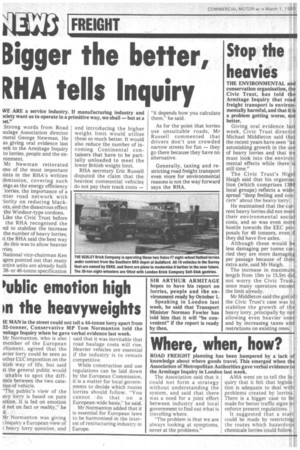Bigger the better, MA tells Inquiry
Page 18

If you've noticed an error in this article please click here to report it so we can fix it.
WE ARE a service industry. If manufacturing industry and )ciety want us to operate in a primitive way, we shall — but at a )st."
Strong words from Road aulage Association director .neral George Newman. He as giving oral evidence last eek to the Armitage Inquiry to lorries, people and the enronment.
Mr Newman reiterated )me of the most important Ants in the RHA's written ibmission, covering such .irigs as the energy efficiency lorries, the importance of a Ater road network with lority on reducing blackots, and the disastrous effect the Windsor-type cordons. Like the Civic Trust before the RHA recognised the ,ed to stabilise the increase the number of heavy lorries; it the RHA said the best way do this was to allow heavier rries.
National vice-chairman Ken )gers pointed out that many ictive units are already built 38or 40-tonne specification and introducing the higher weight limit would utilise these so much better. It would also reduce the number of incoming Continental containers that have to be partially unloaded to meet the lower British weight limit.
RHA secretary Eric Russell disputed the claim that the heaviest commercial vehicles do not pay their track costs — "it depends how you calculate them," he said.
As for the point that lorries use unsuitable roads, Mr Russell commented that drivers don't use crowded narrow streets for fun — they go there because they have no alternative.
Generally, taxing and restricting road freight transport even more for environmental reasons is not the way forward says the RHA.
















































































































